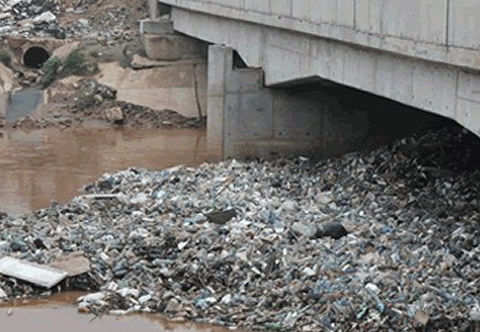Resource gaps militate against sanitation – Expert
 Mr Felix Jefferson Agyei Amakye, a governance expert, has deplored the resource gaps in executing the National Sanitation and Hygiene Policy, particularly in resource, enforcement and funding.
Mr Felix Jefferson Agyei Amakye, a governance expert, has deplored the resource gaps in executing the National Sanitation and Hygiene Policy, particularly in resource, enforcement and funding.
He has therefore called for the establishment of sanitation and hygiene policy for the Metropolitan, Municipal and District Assemblies (MMDAs) to ensure the effective enforcement of the laws.
Mr Amakye said this when he addressed a stakeholders’ forum on Ghana’s Sanitation and Hygiene Policy, organised by the Voice for Change (V4C) Partnership Project, an evidence-based advocacy programme, at Awutu Beraku in the Central Region.
The V4C programme is being implemented by SNV (Netherlands Development Organisation) in collaboration with the International Food and Policy Research Institute (IFPRI) and funded by the Dutch Ministry of Foreign Affairs.
The five-year project is being implemented by SNV together with its alliance of local partner civil society organisations (CSOs) and networks in Ghana to strengthen their capacities to generate reliable and relevant data/evidence to carry out evidence-based advocacy for sustainable improvements in key focus areas.
These relate to renewable energy, water, sanitation and hygiene (WASH) and food security and nutrition.
The Ghana WASH component of the project is dubbed: “Ghana Sanitation and Hygiene for All and Intervention Forum, a non-governmental organisation, and one of four local implementing partner CSOs tasked to implement the project in the Awutu Senya East Municipal Assembly.
Mr Amakye told the stakeholders comprising planning and budget officers, environmental health officers, assembly members, zonal committee chairmen, and unit committee members, that the assembly’s sub-structures were endowed with powers to check sanitation in the communities.
“It is not an individual concern but a collective one, and therefore civil society involvement is key. It is a difficult task but don’t back down or relax. Advocacy is difficult but we shall give you the necessary support,” he assured the gathering.
During an open form, it became clear that most communities in the District were overwhelmed by poor sanitation and mountains of refuse, with some assembly members saying the assembly lacked the necessary tools to work with.
However, Mr Amakye said the people did not need to have these implements before disposing of refuse and filth in the communities, and urged the people to tidy up their own environments.
It also became apparent that though bye-laws on sanitation and hygiene existed, community awareness of them was quite low, resulting in little or no knowledge about the adverse effects of poor hygiene and sanitation. Mr Amakye impressed upon officials of the District Assembly to gazette sanitation and hygiene bye-laws, saying the process has been simplified and is no more complicated.
Madam Nora Ollennu, CEO of Intervention Forum, local implementing agency for the V4C partnership project, said it took into account the need to strengthen the capacities of local CSOs to effectively position them to carry out evidence-based advocacy for sustainable sanitation and hygiene improvements.
One of the short-term outcomes of the V4C project, she stated, was the enhanced capacities of MMDAs and private sector on the existing sanitation and hygiene policies and on their roles and responsibilities.
The stakeholders’ forum was therefore intended to strengthen the existing capacities of key actors at the district level on the Environmental sanitation Policy and its supporting strategies to allow for their effective role play and co-ordination in the delivery of improved sanitation and hygiene at the district level.
“It is also intended to allow us reflect on existing sanitation policy implementation and financing gaps at the district level so that we can collectively work towards ameliorating them,” she stated.
Nai Pobee Abundam VII, Nifahene No 1 of Awutu Beraku Traditional Area, in an interview said he appreciated the essence of the forum, adding: ‘’I have much appreciated today’s forum. Our community is quite large. In view of this, we are not able to deal effectively with the sanitation situation here.
“The forum has indicated the magnitude of the sanitation situation in our community. I have therefore decided to take the issue to our traditional council to see how best, as traditional authorities, we can deal with the situation.’’
Touching on threats from some members of the community against environmental officers, Nai Abundam said: “Every chief has his own area of jurisdiction. So we shall meet and pass bye-laws to effectively deal with offenders and ensure that no sanitation official is threatened or beaten up.”
Madam Cynthia Sankofi, Cooked Food vendor, said was aware of bye-laws on cooked food sellers. “We have the bye-laws here so we are aware of them, so it is not something new at all.
“Every year, we are made to undergo health screening to check our health status. This is to ensure that anyone suffering from malaria or typhoid or any other communicable disease is not allowed to cook and sell.
“Your health report will indicate whether you can or cannot sell food to the public.” Asked how she would pass on this message to her children, Madam Sankofi said: ‘’As a mother, I shall teach my children to embrace proper sanitation and hygiene at all times. I believe that if the child receives good training, he or she will carry this into adulthood.”
She, however, said the main problem at Awutu Beraku was the heap of refuse that had piled up for a number years. “It is now a big problem,’’ and expressed the need for the authorities to remove it or get it levelled up to allow for another round of disposal.
Source: GNA
